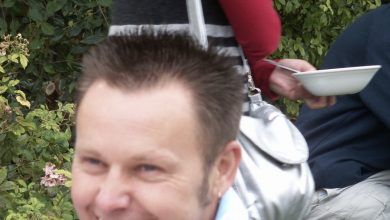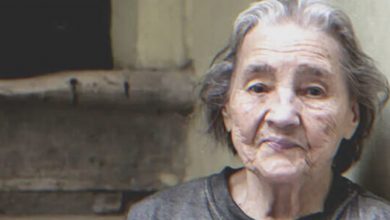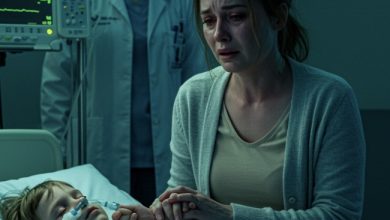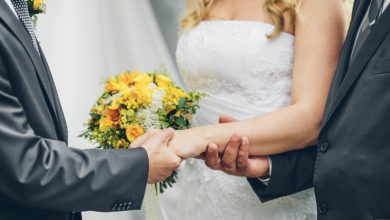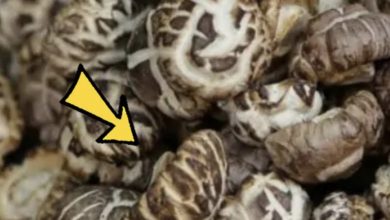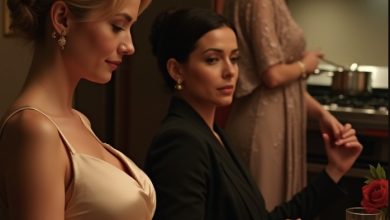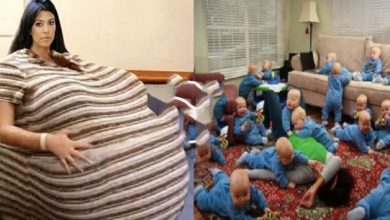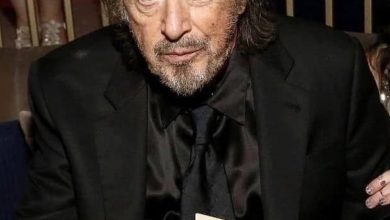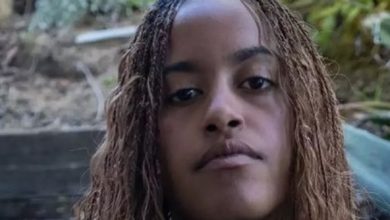“A Call From the School Turned My Life Upside Down — The Boy Waiting in That Office Had My Son’s Eyes.”
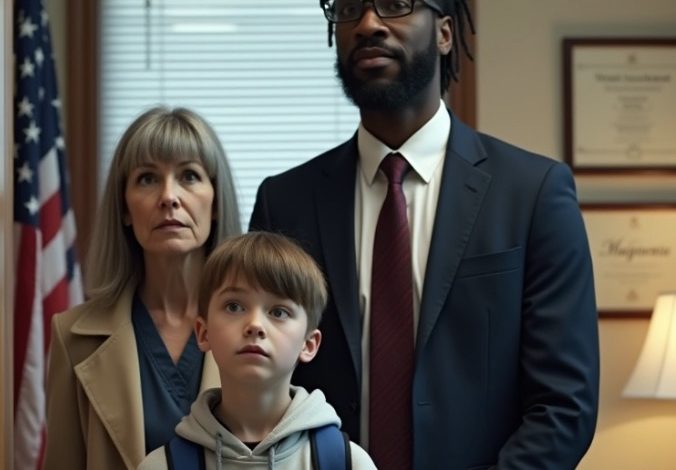
The phone call came in the middle of my workday.
“Dr. Reynolds, there’s a call for you,” my nurse said, holding the phone. “It’s urgent. From Westridge Academy.”
“I’m in surgery,” I answered, still focused on the microscope in front of me.
“They said it’s about your grandson. He’s been expelled.”
For a second, the room around me stopped existing. The monitors still beeped, the instruments still clicked—but my hands froze. “That’s impossible,” I said. “I don’t have a grandson.”
“They were very clear,” she replied. “They asked for you by name.”
I finished the operation, stitched the final line, and left the operating room still trying to make sense of it. The name “Parker” was left on the message. That name hit me in a place I hadn’t touched for years. Rachel Parker. My son William’s first love—the one who disappeared after he died at seventeen.
Seventeen years without her, without him, without answers.
By the time I reached Westridge Academy, my heart felt like it had run a marathon. The school looked perfect from the outside—red brick, clean windows, flags fluttering in the cold Seattle wind. The receptionist led me to the principal’s office, her eyes flicking up at my hospital badge.
Principal Norwood greeted me politely. “Dr. Reynolds, thank you for coming. I know this must be confusing.”
“There’s been some mistake,” I said. “I don’t have a grandson.”
She nodded softly, as though she already expected me to say that. “Please, just come inside.”
The door opened, and my world shifted.
A boy sat there, backpack at his feet, hair messy from nervous hands. He couldn’t have been more than thirteen. But when he looked up, I saw my son’s eyes—deep blue, calm and bright—the same eyes that used to light up my kitchen when William laughed.
“You look exactly like your picture,” he said quietly.
My voice trembled. “Who are you?”
“My name is James William Parker,” he said. “My mom is Rachel Parker. My dad was William Reynolds.”
For a moment, the room tilted. I gripped the chair beside me just to stay standing.
“My son died before you were born,” I whispered.
“He was seventeen when I was born,” the boy said softly. “Mom was sixteen.”
The math worked. Painfully. Perfectly.
“Where’s your mother?” I asked.
His shoulders fell. “That’s why I’m here. She’s been missing for three days. Her boyfriend, Drew, said she left. But she wouldn’t. Not without telling me. I punched his son when he said she ran away with another man.”
“That’s why he’s suspended,” the principal added gently.
Jaime—his name—reached into his pocket and pulled something out. “She said if anything ever happened, I should find you.”
It was a silver pocket watch. My father’s. The one I gave William for his sixteenth birthday. Inside, the engraving still shone: TIME REVEALS TRUTH.
My throat closed. “Where did you get this?”
“Mom kept it in a box with Dad’s things,” he said. “She said it belonged to you.”
There was no denying it anymore. The boy standing in front of me was my grandson.
“I’m taking you with me,” I said quietly.
Principal Norwood handed me papers for temporary guardianship. “It’s best for now,” she said.
We left the school, the sun breaking weakly through the clouds. Jaime walked beside me, clutching his backpack like it was a shield.
“Why didn’t she ever call?” I asked softly as we drove.
“She said she tried,” he replied. “But she thought you hated her. She said you blamed her for the accident.”
The words cut like glass. I remembered that night—the argument with William, my fear that he’d throw away his future for a girl. He left angry. It rained. I never saw him again.
My hospital pager buzzed. I answered automatically.
“Dr. Reynolds,” my colleague said, “female assault victim admitted—name Rachel Parker. Severe head injury, but still alive.”
I pulled the car over and took a deep breath. “I’m on my way.”
We ran through the hospital together. In the trauma room, Rachel lay pale and broken, a bruise blooming across her face. Jaime reached for her hand.
“Mom,” he whispered, tears thick in his throat. “I found her. She’s here.”
The nurse began moving monitors, preparing for surgery.
“She’ll make it,” I told him, though fear gripped every part of me.
That night, while another surgeon operated, I stayed in the hallway with Jaime. We sat in silence, the hum of machines our only language. I called the police, filed a report, gave them Drew’s name. Then I stayed, because that’s what family does.
Hours passed. When the doctor came out, his face was tired but calm. “She’s stable,” he said. “The surgery went well. She’ll need time to heal.”
Jaime exhaled hard, collapsing against the chair. I wrapped a blanket around him. He fell asleep holding the pocket watch.
When he woke, he said, “Mom always said you were brilliant but scary.”
“Scary?” I laughed softly. “Maybe a little.”
“She said you could fix anything.”
“I’m trying,” I said.
He smiled—William’s smile—and I felt something I hadn’t in years. Hope.
The next days blurred into one long rhythm of hospital visits, police reports, and late-night meals that neither of us really ate. When Rachel finally opened her eyes, Jaime was the first thing she saw.
“Mom,” he whispered.
Her voice came out weak but certain. “Jaime.”
Then her eyes met mine. “Dr. Reynolds.”
“I’m here,” I said, fighting back tears. “You’re safe.”
Later, when she was awake enough to talk, I told her we’d found her letter—the one she wrote all those years ago, telling me she was pregnant.
“I sent it,” she whispered. “You never answered.”
“I never saw it,” I said. “My assistant must have hidden it to protect me. I’m so sorry.”
Rachel’s eyes filled. “You’re here now. That’s what matters.”
She healed slowly but stubbornly. Jaime spent every night between homework and hospital visits. When she was discharged, I offered them a place to stay.
“Just until you’re back on your feet,” I said.
Rachel hesitated. “I don’t want to be a burden.”
“You’re family,” I told her. “That’s not a burden. That’s a reason.”
My quiet condo turned into a home. Jaime filled it with life—music, laughter, sneakers by the door. Rachel cooked real food again. Sometimes I’d catch them both singing along to an old song, and for a second, it felt like William was still here.
Rachel started therapy to recover her speech and memory. Jaime returned to school, where the principal decided to give him another chance. “We believe in second chances,” she told him.
He worked hard—too hard sometimes—but he was determined to prove himself.
Months passed. Drew, Rachel’s ex, was arrested for assault. He confessed, and justice was done. The fear that had hung over her finally lifted.
Life began to rebuild itself in small, careful ways. Rachel found work as a therapist, helping other survivors heal. Jaime started guitar lessons. He had his father’s natural rhythm and could play for hours.
One evening, as I cooked dinner, he came into the kitchen. “Grandma,” he said, “do you think I should go into music or medicine?”
I smiled. “Whatever makes you feel alive,” I said. “That’s the right choice.”
Years passed like that. We learned to be a family. To celebrate birthdays and graduations and ordinary Tuesdays.
When Jaime graduated high school, we held a small party at my house. Rachel wore a blue dress, her favorite color. The table was covered in flowers and pancakes—his favorite breakfast, even now.
A friend from the hospital brought him a gift: a doctor’s bag and a letter offering him a scholarship in my name if he chose to study medicine.
He looked at me, eyes bright. “Is this real?”
“It’s real,” I said. “But it’s your choice.”
He thought for a moment. “Maybe I can do both. Heal people in my own way.”
Later that evening, I gave him the pocket watch. “It’s time this belonged to you,” I said.
He opened it, tracing the engraving. “Time reveals truth.”
“Yes,” I said softly. “And it finally did.”
Years ago, that call from Westridge Academy shattered everything I thought I knew. I didn’t have a grandson—until I did. I didn’t have a family—until one found me.
Now, as I watch him step onto the stage in his graduation gown, Rachel beside me, I realize something I wish I’d known sooner: love doesn’t always arrive when you expect it. Sometimes it shows up in a school office, wearing a backpack and your son’s eyes.
And when it does, you answer the call.
Because time—if you’re lucky—reveals not just truth.
It reveals grace.

